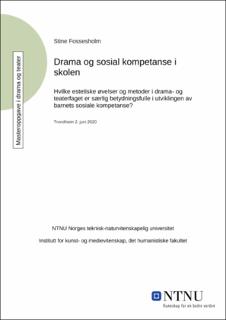| dc.contributor.advisor | Rasmussen, Bjørn | |
| dc.contributor.author | Fossesholm, Stine | |
| dc.date.accessioned | 2021-09-14T16:06:02Z | |
| dc.date.available | 2021-09-14T16:06:02Z | |
| dc.date.issued | 2020 | |
| dc.identifier | no.ntnu:inspera:53759497:26702160 | |
| dc.identifier.uri | https://hdl.handle.net/11250/2776590 | |
| dc.description.abstract | Sammendrag
Denne studien har sin bakgrunn i min interesse for dramapedagogikk og spesialpedagogikk. Den har tatt utgangspunkt i hvordan drama som metode kan benyttes for å utvikle barns sosiale kompetanse. Sosial kompetanse forstås som evnen til å benytte spesifikke atferdssekvenser i gitte kulturelle og samfunnsmessige kontekster. Den gjennomgår hvordan spesialpedagogiske modeller benytter seg av dramafaglige øvelser for innlæringen av sosial kompetanse, og hvordan dramafaglige øvelser og metoder utvikler sosial kompetanse. I tillegg har den beskrevet sosial kompetanse inngående. Dette gjennom å benytte en form for dokumentanalyse. De sentrale spesialpedagogiske modellene har vært: AART, DUÅ, Mestringskatten og prosjekt Charlie. Først og fremst har studien funnet at de spesialpedagogiske modellene i liten grad beskriver hva som trengs av ferdigheter hos lærere og elever for å benytte drama til innlæringen av sosiale kompetanse. Modellene beskriver også i liten grad hvordan man bruker dramfaglige øvelser for utviklingen av sosial kompetanse. Ofte anbefaler den bruke av rollespill uten vider fordypning av dette.
Oppgaven har videre analyserte en rekke dramafaglige metoder og øvelser, og hvordan de kan bidra til utviklingen av spesifikke sosial ferdigheter hentet fra den spesialpedagogiske litteraturen. Den har blant annet funnet at for å kunne delta i ei gruppe og benytte seg av dramafaglige metoder og øvelser for innlæringen av sosial kompetanse trengs det noen grunnleggende sosiale ferdigheter på forhånd. I tillegg kan lærerens undervisningsstil og evne til å sjonglere mellom ulike roller som: instruktør, lærer, pedagog og kunstner ha betydning for elevenes læringsutbytte. Også ulike rammefaktorer rundt undervisningen er elementer som påvirker muligheten for å benytte ulike dramafaglige øvelser og metoder for innlæringen av sosial kompetanse i skolen.
Studien bærer preg av praksisledet forskning, å forske i egen praksis, og har tatt utgangspunkt i «the descriptive phenomenological method» av Amedeo Giorgi for å analysere loggnotatene. Mine loggnotater er i stor grad studiens analysemateriale og utgangspunktet for å besvare problemstillingen. De ble skrevet over flere år, først og fremst i forbindelse med arbeid med elever på mellomtrinnet og ungdomstrinnet.
Studien har funnet åtte sosiale ferdigheter som i ulik grad kan innlæres gjennom ulike dramafaglige øvelser og metoder. Øvelsene og metodene befinner har blitt delt inn i tre nivåer; nybegynner, øvet og viderekommende. Metoder som rollespill, fra dramaprosess til forestilling, grunnlagsøvelser, viewpoints og scenekamp har vært sentrale i analysen i denne oppgaven. Studien stiller også spørsmål rundt i hvilke grad lærers, elevers og skolens enkelte kompetanse, erfaring og forståelse er med på å gjøre det mulig å benytte dramafaglige øvelser og metoder i innlæringen av sosial kompetanse hos barn. | |
| dc.description.abstract | Summary
The study is based on my interest in drama education and special education. It has taken into account how drama as a method can be used to develop social competence skills in children. This study demonstrates an understanding of social competence as how specific behaviour sequences can be used in specific cultural and societal contexts. It examines how special education models use drama related exercises for learning social skills and how drama related exercises with models can be used to further develop social competence. In addition, this study describes social competence extensively. This is done by using a kind of document analysis. The special education models that have been the key models in this study are AART (ART), DUÅ (TIY), Mestringskatten (CBT) and project- Charlie. The study found that the models from special education to a small extent, described what kind of skills were needed for teachers and students to apply drama as a way of learning social competence. There were also not that many descriptions on how drama exercises could contribute to the development of social competence. The models often recommend the use of role-play.
This thesis has analysed a number of different drama related methods and exercises and how they can contribute to the development of specific social skills derived from the literature of special education. It has found that in order to participate in a group and use drama related exercises and methods for the learning of social skills, some basic social skills are needed in advance. In addition, the teacher’s way of teaching and the ability to juggle between different roles like an instructor, teacher, educator and artist can have an impact on the student’s learning outcomes. Different ways of framing the education are also elements that influence the possibilities to use different drama related exercises and methods for learning social competence in school.
This study uses practice as research (PaR) as the main method of doing the research. The log notes are for the most analysed by using “descriptive phenomenological method” by Armedeo Giorgi. The log notes and this analysis are the studies main material. This also portrays to give some answers to the issues. The notes have been written over several years, from middle class students to youth students.
The study has found eight social skills that can be learned through different drama related exercise and methods. The exercises and methods have been divided into three levels; beginner, practiced and advanced. Methods such as role-play, from process to performance, ground exercises, viewpoints and stage fight have been central to the analysis in this thesis. The thesis also asks questions to what extent teachers, students and a school’s individual competence, experience and understanding makes it possible to make use of drama related exercises and methods for the learning of social competence in children. | |
| dc.language | | |
| dc.publisher | NTNU | |
| dc.title | Drama og sosial kompetanse i skolen
Hvilke estetiske øvelser og metoder i drama- og teaterfaget er særlig betydningsfulle i utviklingen av barnets sosiale kompetanse? | |
| dc.type | Master thesis | |
